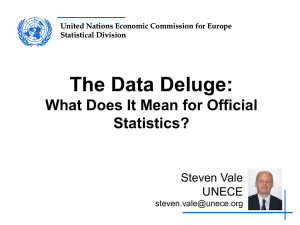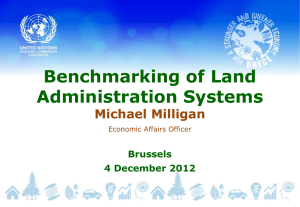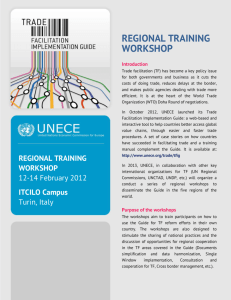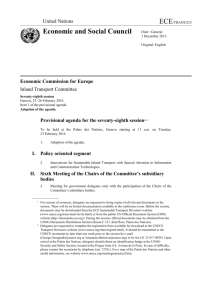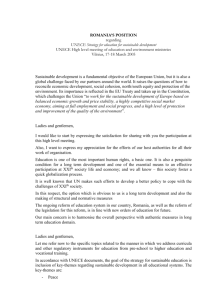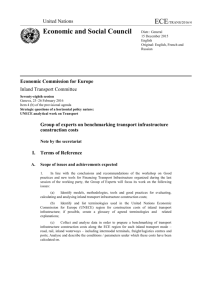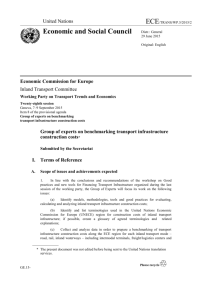XMPI Manual Chp. 9 - United Nations Statistics Division
advertisement
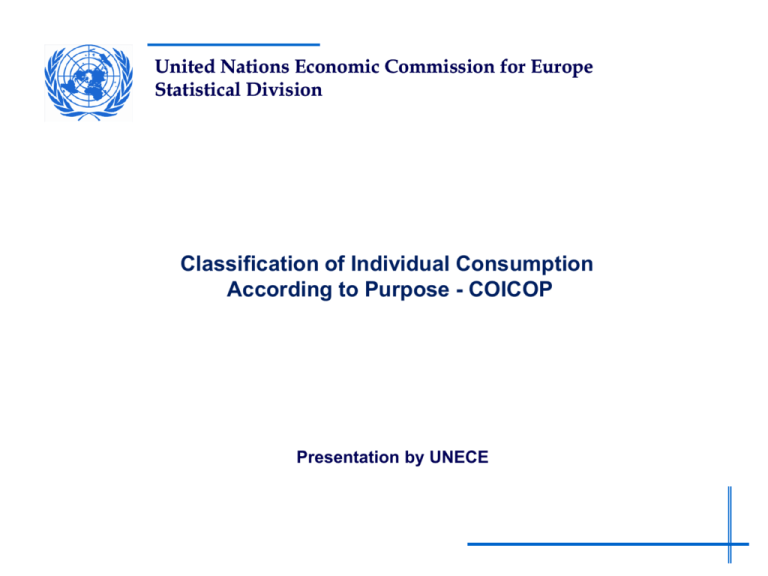
United Nations Economic Commission for Europe Statistical Division Classification of Individual Consumption According to Purpose - COICOP Presentation by UNECE Overview of presentation 1. COICOP 2. Need for a revision? 3. Replies from EECCA countries 4. Examples of possible changes UNECE Statistical Division Slide 2 COICOP 1. COICOP is adopted by the UNSC 2. The current version was introduced in 1999 3. The objective of COICOP is to provide a set of homogeneous categories of goods and services, which are considered a function or purpose of expenditures by households with the object of classifying transactions in relation to individual consumption, social transfers and households' real consumption UNECE Statistical Division Slide 3 COICOP COICOP consists of 4-digits at 3 levels of aggregation Level 1: 14 divisions, identified by two-digit numerical codes Level 2: 58 groups, identified by three-digit numerical codes Level 3: 157 classes, identified by four-digit numerical codes UNECE Statistical Division Slide 4 COICOP • • • • • • • • • • • • • • • 01-12 Individual consumption expenditure of households 01 Food and non-alcoholic beverages 02 Alcoholic beverages, tobacco and narcotics 03 Clothing and footwear 04 Housing, water, electricity, gas and other fuels 05 Furnishings, household equipment and routine household maintenance 06 Health 07 Transport 08 Communication 09 Recreation and culture 10 Education 11 Restaurants and hotels 12 Miscellaneous goods and services 13 Individual consumption expenditure of non-profit institutions serving households (NPISH) 14 Individual consumption expenditure of general government UNECE Statistical Division Slide 5 COICOP Main uses of COICOP in the areas of: • National accounts • Consumer price indices • Household budget surveys • Purchasing power parities UNECE Statistical Division Slide 6 Need for a revision? • The UN Expert Group on International Statistical Classifications (EG-ISC) periodically reviews classifications to ensure their relevance for the production of statistics • The need for a revision of COICOP has been raised by countries and organisations to reflect the emergence of new consumer goods and services and the development in consumption patterns • UNSD in late 2012 conducted a global survey to evaluate the need for a revision. 74 countries has replied to the survey • The EG-ISC in 2013 will discuss the outcome of the survey and agree on scope and character of a possible revision UNECE Statistical Division Slide 7 Replies from EECCA countries to COICOP Survey Six EECCA countries have responded to the survey: Armenia, Azerbaijan, Belarus, Georgia, Russian Federation, Ukraine Summary of main replies: • The overall structure and the level of detail are suitable • More details and guidance on the treatment of bundled services and telecommunications would be useful • A 5-digit level should be introduced, while, on the other hand, coherence over time can only be maintained at 4-digit level! • The division in goods and services should be maintained • Applications for smart phones (Apps) should have a specific 4digit class of its own UNECE Statistical Division Slide 8 Examples of possible changes 01. Food and non-alcoholic beverages • Ready made meals: new 4-digit class? • Should ready made meals be recorded under 01.1 Food or 11.1 Catering Services? • 01.1.4 Milk, cheese and eggs looks heterogeneous; create separate class for eggs? • Is there a need for separate class for potatoes, now under 01.1.7 Vegetables? UNECE Statistical Division Slide 9 Examples of possible changes 04.5.1 or 07.2.2 - Electricity for transport • Should electricity for cars – and other vehicles - be recorded under 04.5.1 Household electricity, or 07.2.2 Fuels for transport? 06. Health – and 12.1.1 Beauty shops • The borderlines between 06.2 Outpatient services, 06.3 Hospital Services and 12.1.1 Beauty shops are unclear • Where to record plastic surgery/Botox not for medical purposes? UNECE Statistical Division Slide 10 Examples of possible changes 08.2-08.3 Telephone and telefax equipment and services 09.1 Audio visual, photographic and information processing equipment • The distinction between communication (08.2-08.3) and 09.1 becomes still less clear: e.g. mobile phones with photographic and information processing functions • The delineation of the classes of 09.1 does not reflect properly the latest development – e.g. touch-pads, computers used as televisions, video on demand • Downloads of videos, music or electronic books. Is there a difference between streaming and permanent downloads? • When should download be considered goods or services, respectively (09.1.4, 09.4.2, 09.5.1)? UNECE Statistical Division Slide 11 Examples of possible changes • Paid access to news sites and electronic newspapers, should be included in 09.4.2/09.5.2 • Applications for smart phones – guidance on where to record these should be provided • 08 and 09 should be updated; not too tight specifications to accommodate technological development 10. Education • Should be updated to reflect the 2011 International Standard Classification of Education (ISCED) UNECE Statistical Division Slide 12 Examples of possible changes Bundled goods and/or services Common in telecommunication, computers and software, cars, vacation, fast food restaurants. Separation or creation of new classes? Separation of goods and services A revision should take the need to separate goods and services into account Level of detailed Is the 4-digit level sufficient, or should a 5-digit level be introduced? UNECE Statistical Division Slide 13 Comments and suggestion can be send to rami.peltola@unece.org Thanks! UNECE Statistical Division Slide 14
